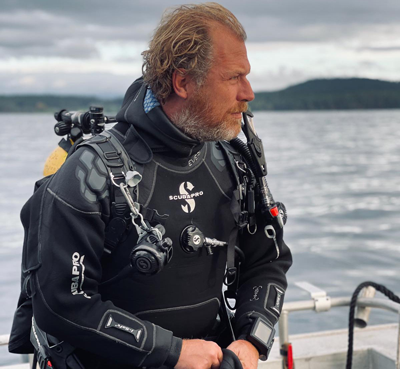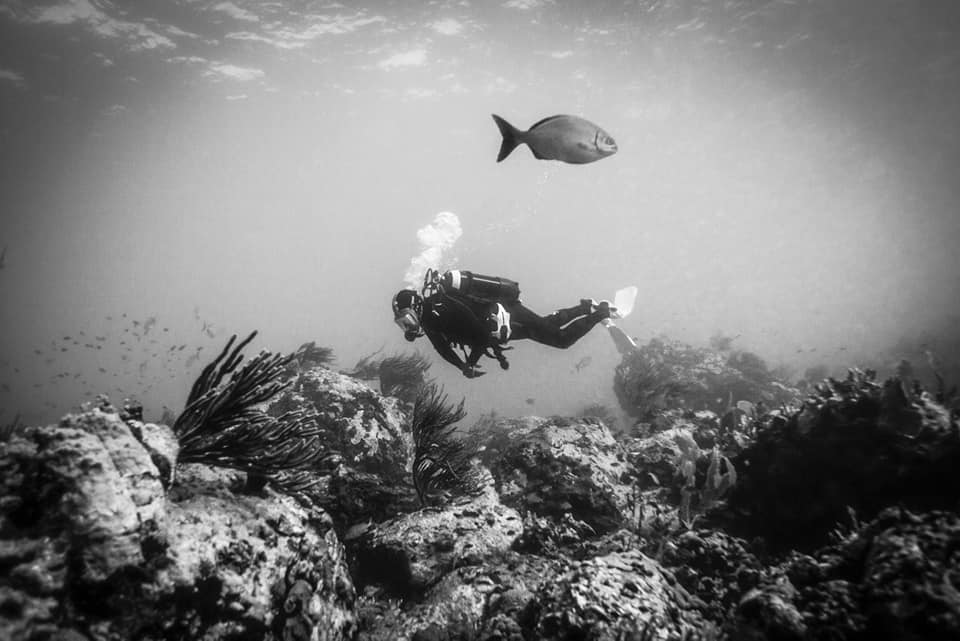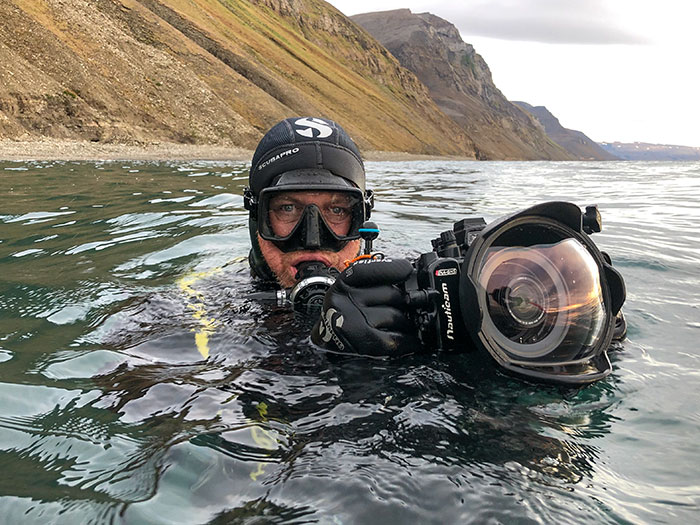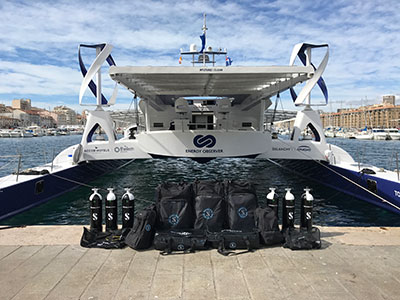
SCUBAPRO Deep Elite Team - Jerome Delafosse
Jerome Delafosse
Jerome Delafosse is an explorer, documentary film director and diving professional. Jerome was an underwater photographer for many years and participated in a number of underwater expeditions including the archeological exploration of the sunken palace of Cleopatra in Alexandria and the Cosquer Grottos in France. Jerome has dove to 1000 meters in a small submarine vehicle, discovering the bioluminescence of the abyss and was also one of the first to dive in a cage with the Great White sharks in South Africa, in the 1990’s. It was after these many adventures that he started to make documentary films. In 2015, Jerome became the co-leader and head of the expedition ‘Odyssey for the Future’ with Energy Observer, the first vessel propelled completely by renewable energy and hydrogen.

An Interview with Jerome Delafosse
Why did you decide to take the giant stride into the oceans? What got you started in diving?
I grew up in Saint Malo, a historic port town in Brittany, France on the English Channel coast. I knew how to dive with a mask before I even really knew how to swim. But the day that I really decided to dedicate my life to exploring the oceans was when my mother took me to see the Jacques Cousteau film ‘The Singing Whale’. It was a real eye-opener. I was 10 years old then and I have never deviated from that path.
How has diving changed your life?
I quit school early, just a few weeks away from graduating from high school (a great disappointment to my parents), in order to pursue diving. I don’t recommend this to my own children, but I have always lived only to dive, both scuba and freediving. Diving has permitted me to become the man I dreamed of becoming.

What kind of diving do you like to do?
Diving with sharks is without a doubt the most fascinating diving that I have ever experienced. Since the beginning, I have also always enjoyed cold water diving, because it is in such places that many hidden wonders are concealed. The truth is that I like all types of diving. Underwater archeology also allows the discovery of secrets, hidden in the oceans for millenniums.
What is one of the most amazing experiences you have had underwater?
Without a second thought, I would say diving with the Humboldt squid off the Peruvian coast in the middle of the night and requiring 5 hours of navigation to get to them, with hundreds of squid surrounding me, some measuring as long as 2 meters and weighing 100 kilos. They passed around me like torpedoes, changing color from bright red to white. I think that it was my ‘close encounter of the third kind’ with real aliens, but today they are now one of my favorite creatures. Another experience that was for me a real miracle, was breathing with a regulator. That may seem insignificant, but for me it remains a magical memory, engraved in me forever.
Of your list of accomplishments in your diving career, what are you most proud of?
Today ‘exploration’ doesn’t make any sense unless it is paired with finding solutions that will permit us to create a cleaner and more fair world, and it is the only way that we can get out of the situation in which we find ourselves today. I am proud to be committed to saving our Oceans through numerous actions which I have carried out. Its important that every diver commits themselves, in their own way, to the preservation of the Oceans and creatures that populate them.

What is your advice to someone who is considering diving?
To jump in without hesitation, seize the chance to explore this world that has everything to discover, to discover the diversity of a miracle of every moment from the infinitely large to the infinitely small, from tropical seas to icy oceans at the poles. It’s wonderful!
Why do you think we should encourage more people to dive?
Diving allows each one of us a privileged encounter with nature, from which we have distanced ourselves over time, to the point that we believe we can dominate and exploit nature without consequences, like with what we are confronted with today, pollution and climate change. Renewing the link with nature that has been lost permits us to learn that nature is the result of 3,8 billion years of evolution. The tropical coral reefs, for example, were originally quite poor in nutrients, but they have been able to develop a symbiosis with zooxanthellae, the microscopic algae, that provides them with what they need to live. This principle of cooperation developed at the reef level, where each inhabitant has its place. And now today coral reefs represent 10% of the surface of the Oceans and shelter ¼ of the marine biodiversity. And all this thanks to a system founded on cooperation, rather than on competition; without a doubt we should look there for inspiration to give us a new direction to our civilization.
What would you tell people about the oceans?
We often hear that Oceans represent 2/3 of the surface of the planet, however in reality if we consider their volume, they represent 98% of the Earth’s biosphere. They are everything to us, they produce 2/3s of the oxygen that we breath, they regulate our climate, they allow more than a billion women and men to feed themselves, and above all they are the sanctuary of an unsuspecting biodiversity, of which we know practically nothing. Only 15% or our Oceans have been explored as of today. We must do everything we can to protect them, beginning by questioning our lifestyles, the use of single plastic and more broadly , the impact of our consumption habits, which unfortunately often have a negative impact on marin ecosystems without us even realizing it.

What is your favorite thing in your dive bag?
My Frameless mask of course! It is what allowed me to leave the earthly world and clearly see the underwater world, where I have passed so much time since my childhood.
Why is SCUBAPRO your choice for dive equipment?
SCUBAPRO has been with me since the beginning of my underwater adventures, more than 30 years ago now. My first regulator was the iconic G250, my first BC was the Double Black stabilizing jacket and my first fins were the Jet fins. For me it’s an iconic brand and always a guaranty of safety, especially when diving under the ice in Greenland or Japan, or in currents in the Coco Islands with sharks, or at Lake Titicaca at 4000 meters of altitude. My SCUBAPRO gear has never failed me, even in the most extreme conditions.
Follow Jerome on Instagram: @jerome.delafosse




